The Bruxism Management Market is estimated to be valued at USD 7.2 billion in 2025 and is projected to reach USD 14.0 billion by 2035, registering a compound annual growth rate (CAGR) of 6.9% over the forecast period.
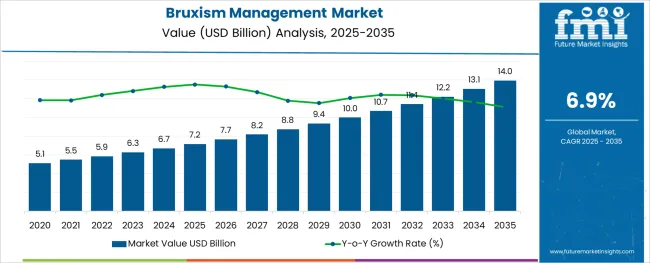
The bruxism management market is experiencing steady growth due to increasing awareness about the health impacts of teeth grinding and clenching. Healthcare providers and dental specialists are placing more emphasis on early diagnosis and management, recognizing the negative effects of bruxism on oral health and overall wellbeing. Rising stress and anxiety levels globally have been linked to the prevalence of bruxism, further driving the need for effective treatments.
Advances in dental technology and therapy options have expanded the tools available to practitioners, improving patient outcomes. Additionally, growing public interest in sleep health and dental wellness is contributing to market expansion.
The future outlook remains positive as multidisciplinary approaches to managing bruxism gain traction. Segmental growth is expected to be led by nocturnal bruxism as the primary type, dental approaches as the preferred treatment, and anxiety as the key underlying cause.
The market is segmented by Type, Treatment Type, Cause, and Distribution Channel and region. By Type, the market is divided into Nocturnal Bruxism and Diurnal Bruxism. In terms of Treatment Type, the market is classified into Dental Approaches, Drugs, Antianxiety Agents, Tranquilizers, Sedatives, Muscle Relaxants, Occlusal Splint, and Mouth Guard. Based on Cause, the market is segmented into Anxiety, Obstructive Sleep Apnea, Sleep Paralysis, Malocclusion, Gastroesophageal Reflux Disease (GERD), Depression, and Others. By Distribution Channel, the market is divided into Retail Sales, Institutional Sales, Hospital, Dental Clinic, Drug Store, Retail Store, Supermarket, and Mail Order Pharmacies. Regionally, the market is classified into North America, Latin America, Western Europe, Eastern Europe, Balkan & Baltic Countries, Russia & Belarus, Central Asia, East Asia, South Asia & Pacific, and the Middle East & Africa.
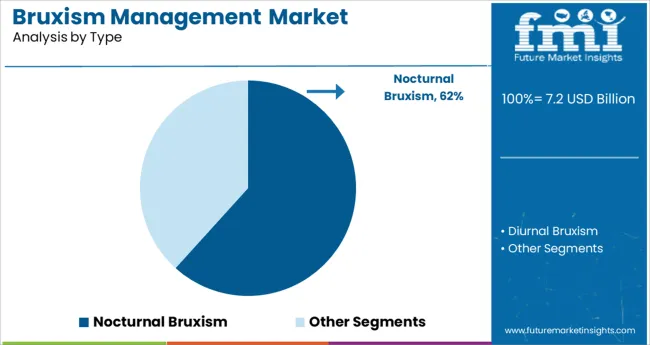
The nocturnal bruxism segment is projected to hold 61.7% of the bruxism management market revenue in 2025, making it the dominant type segment. This growth is attributed to the widespread occurrence of teeth grinding during sleep, which often goes undiagnosed but can lead to significant dental damage and discomfort. Increased awareness among patients and clinicians has encouraged proactive screening for nocturnal bruxism, especially in individuals reporting sleep disturbances and jaw pain.
The segment’s growth is also supported by technological improvements in sleep monitoring devices that assist in diagnosis.
As understanding of the condition improves, nocturnal bruxism management is expected to maintain its leading position in the market.
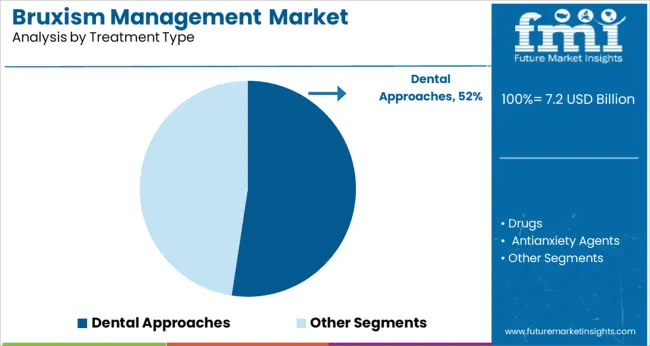
Dental approaches are forecasted to account for 52.4% of the bruxism management market revenue in 2025, holding the largest share among treatment types. This is due to the effectiveness of oral appliances such as night guards, splints, and bite guards in protecting teeth and alleviating symptoms. Dentists are increasingly recommending customized dental devices that provide comfort and reduce the damage caused by grinding.
Advances in materials and design have improved patient compliance and treatment outcomes. Dental treatments are often combined with behavioral therapies for comprehensive management.
The segment benefits from growing patient preference for non-invasive interventions and the established role of dental professionals in bruxism care.
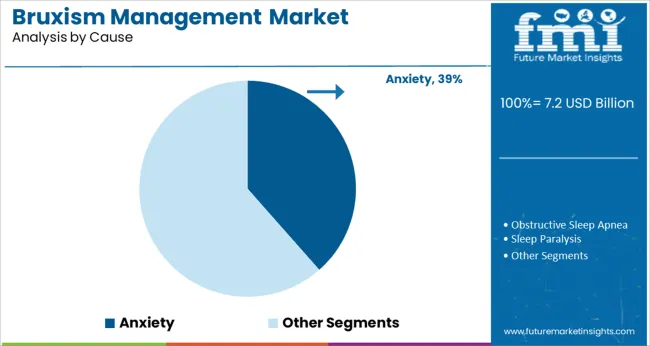
Anxiety is expected to represent 38.5% of the market in 2025 as a leading cause of bruxism. Psychological stress and anxiety have been widely recognized as key triggers for teeth grinding and jaw clenching. Mental health awareness campaigns and clinical studies have underscored the link between emotional wellbeing and bruxism prevalence.
Healthcare providers are incorporating stress management techniques alongside physical treatments to address the root cause.
The rising global incidence of anxiety disorders is likely to contribute to sustained demand for bruxism management solutions targeting this underlying factor. As multidisciplinary approaches gain acceptance, addressing anxiety will remain central to effective bruxism care.
The rising prevalence of neurological disorders, such as Parkinson’s and Huntington’s disease among the geriatric population is a vital factor that is likely to push sales of bruxism management devices in the evaluation period.
As per Parkinson’s Foundation, more than 10 million people are currently living with the disease across the globe. This number is estimated to grow at a steady pace, thereby propelling the market.
In addition to that, the growing cases of sleep apnea are expected to contribute to the global market growth. The American Sleep Apnea Association mentions that about 22 million people suffer from sleep apnea every year in the USA. alone.
Out of this, nearly 80% cases of severe and moderate obstructive sleep apnea remain undiagnosed. Spurred by the aforementioned factors, the global market is set to grow at a fast pace.
Researchers have found that medications are not very effective for the treatment of bruxism. Thus, they are striving to manage the consequences of this condition by promoting preventative measures. It involves the utilization of occlusal splints, mandibular advancement devices, stress management, and similar other devices.
A wide range of medications and muscle relaxants are being used to treat sleep bruxism. However, these medications can cause numerous side-effects, such as muscle weakness, nausea, and constipation. Also, bruxism mouth guards often ground down with time.
The unavailability of effective treatment options may hence hamper the global bruxism management market growth.
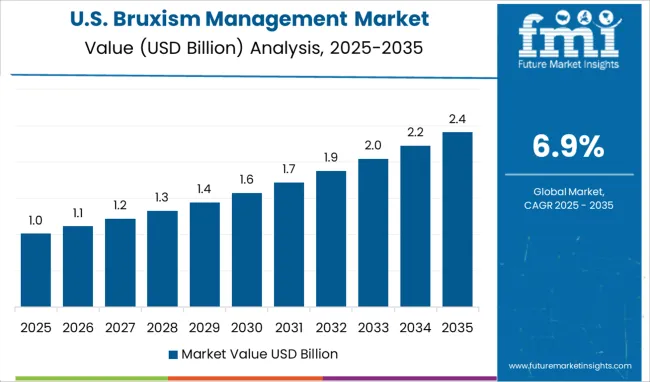
North America is set to dominate in the near future by accounting for the largest bruxism management market share. Rising stress and anxiety among the populaces in the USA. and Canada is one of the major factors that is expected to bode well for the regional market.
As per the National Alliance on Mental Illness, more than 40 million adults have an anxiety disorder in the USA. Likewise, nearly 7% of children belonging to the age group of 3 to 17 years, experience various issues with anxiety every year in the country. This trend is projected to continue throughout the forthcoming years, thereby boosting the regional market.
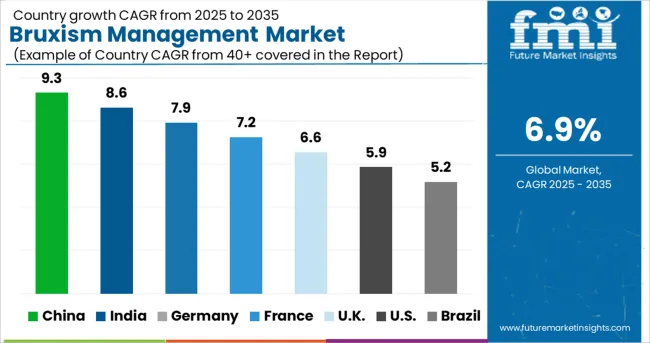
At present, Asia Pacific has a relatively low penetration for bruxism treatment products. Governments of various countries, such as India, China, South Korea, and Japan are investing huge sums to develop their healthcare infrastructure.
Many international companies are expected to set up their manufacturing facilities in these countries owing to the easy availability of low-cost labor and raw materials.
The increasing prevalence of sleeping bruxism across Asia Pacific is another major factor that is set to fuel the growth. The rising workplace stress and rapidly changing lifestyle in this region are also projected to expand the Asia Pacific bruxism management market size.
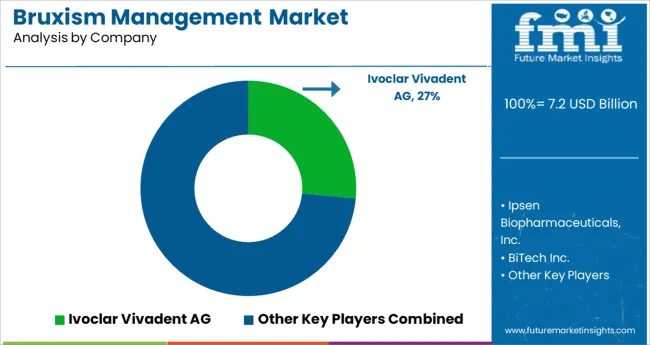
Some of the renowned companies present in the global bruxism management market are F. Hoffmann-La Roche AG, GlaxoSmithKline plc, Eli Lilly and Company, Mayne Pharma, Cadila Pharmaceuticals, Teva Pharmaceutical Industries Ltd., Pfizer, Endo International plc, Akervall Technologies, Inc., and Mylan N.V. among others.
Majority of the companies operating in the global market are increasingly focusing on research and development activities to introduce cutting-edge bruxism treatment options. The market is projected to witness the entry of several start-up companies that would target the infant population and come up with new medications for them.
In June 2024, for instance, SelfSense Technologies, an Irish start-up firm, announced its plan to close a €1 million funding round by launching its new intelligent mouth guards in Europe and Ireland.
The company aims to cater to the needs of patients suffering from bruxism by providing them with innovative guards. Thus, the increasing number of new product launches by start-up companies is set to propel the growth in this market.
| Report Attribute | Details |
|---|---|
| Growth Rate | CAGR of 6.9% from 2025 to 2035 |
| Base Year for Estimation | 2024 |
| Historical Data | 2020 to 2024 |
| Forecast Period | 2025 to 2035 |
| Quantitative Units | Revenue in million and CAGR from 2025 to 2035 |
| Report Coverage | Revenue Forecast, Volume Forecast, Company Ranking, Competitive Landscape, Growth Factors, Trends and Pricing Analysis |
| Segments Covered | Type, Treatment Type, Cause, Distribution Channel, Region |
| Regions Covered | North America; Latin America; Western Europe; Eastern Europe; APEJ; Japan; Middle East and Africa |
| Key Countries Profiled | USA, Canada, Brazil, Argentina, Germany, UK, France, Spain, Italy, Nordics, BENELUX, Australia & New Zealand, China, India, ASEAN, GCC, South Africa |
| Key Companies Profiled | F. Hoffmann-La Roche AG; GlaxoSmithKline plc; Eli Lilly and Company; Mayne Pharma; Cadila Pharmaceuticals; Teva Pharmaceutical Industries Ltd.; Pfizer; Endo International plc; Akervall Technologies, Inc.; Mylan N.V. |
| Customization | Available Upon Request |
The global bruxism management market is estimated to be valued at USD 7.2 billion in 2025.
It is projected to reach USD 14.0 billion by 2035.
The market is expected to grow at a 6.9% CAGR between 2025 and 2035.
The key product types are nocturnal bruxism and diurnal bruxism.
dental approaches segment is expected to dominate with a 52.4% industry share in 2025.






Our Research Products

The "Full Research Suite" delivers actionable market intel, deep dives on markets or technologies, so clients act faster, cut risk, and unlock growth.

The Leaderboard benchmarks and ranks top vendors, classifying them as Established Leaders, Leading Challengers, or Disruptors & Challengers.

Locates where complements amplify value and substitutes erode it, forecasting net impact by horizon

We deliver granular, decision-grade intel: market sizing, 5-year forecasts, pricing, adoption, usage, revenue, and operational KPIs—plus competitor tracking, regulation, and value chains—across 60 countries broadly.

Spot the shifts before they hit your P&L. We track inflection points, adoption curves, pricing moves, and ecosystem plays to show where demand is heading, why it is changing, and what to do next across high-growth markets and disruptive tech

Real-time reads of user behavior. We track shifting priorities, perceptions of today’s and next-gen services, and provider experience, then pace how fast tech moves from trial to adoption, blending buyer, consumer, and channel inputs with social signals (#WhySwitch, #UX).

Partner with our analyst team to build a custom report designed around your business priorities. From analysing market trends to assessing competitors or crafting bespoke datasets, we tailor insights to your needs.
Supplier Intelligence
Discovery & Profiling
Capacity & Footprint
Performance & Risk
Compliance & Governance
Commercial Readiness
Who Supplies Whom
Scorecards & Shortlists
Playbooks & Docs
Category Intelligence
Definition & Scope
Demand & Use Cases
Cost Drivers
Market Structure
Supply Chain Map
Trade & Policy
Operating Norms
Deliverables
Buyer Intelligence
Account Basics
Spend & Scope
Procurement Model
Vendor Requirements
Terms & Policies
Entry Strategy
Pain Points & Triggers
Outputs
Pricing Analysis
Benchmarks
Trends
Should-Cost
Indexation
Landed Cost
Commercial Terms
Deliverables
Brand Analysis
Positioning & Value Prop
Share & Presence
Customer Evidence
Go-to-Market
Digital & Reputation
Compliance & Trust
KPIs & Gaps
Outputs
Full Research Suite comprises of:
Market outlook & trends analysis
Interviews & case studies
Strategic recommendations
Vendor profiles & capabilities analysis
5-year forecasts
8 regions and 60+ country-level data splits
Market segment data splits
12 months of continuous data updates
DELIVERED AS:
PDF EXCEL ONLINE
Tax Management Market Size and Share Forecast Outlook 2025 to 2035
Key Management as a Service Market
Cash Management Supplies Packaging Market Size and Share Forecast Outlook 2025 to 2035
Fuel Management Software Market Size and Share Forecast Outlook 2025 to 2035
Risk Management Market Size and Share Forecast Outlook 2025 to 2035
SBOM Management and Software Supply Chain Compliance Market Analysis - Size, Share, and Forecast Outlook 2025 to 2035
Case Management Software (CMS) Market Size and Share Forecast Outlook 2025 to 2035
Farm Management Software Market Size and Share Forecast Outlook 2025 to 2035
Lead Management Market Size and Share Forecast Outlook 2025 to 2035
Pain Management Devices Market Growth - Trends & Forecast 2025 to 2035
Data Management Platforms Market Analysis and Forecast 2025 to 2035, By Type, End User, and Region
Cash Management Services Market – Trends & Forecast 2025 to 2035
CAPA Management (Corrective Action / Preventive Action) Market
Exam Management Software Market
Asset Management Services Market Size and Share Forecast Outlook 2025 to 2035
Light Management System Market Size and Share Forecast Outlook 2025 to 2035
Labor Management System In Retail Market Size and Share Forecast Outlook 2025 to 2035
Waste Management Carbon Credit Market Size and Share Forecast Outlook 2025 to 2035
Waste Management Market Size and Share Forecast Outlook 2025 to 2035
Stool Management System Market Analysis - Size, Share, and Forecast Outlook 2025 to 2035

Thank you!
You will receive an email from our Business Development Manager. Please be sure to check your SPAM/JUNK folder too.
Chat With
MaRIA